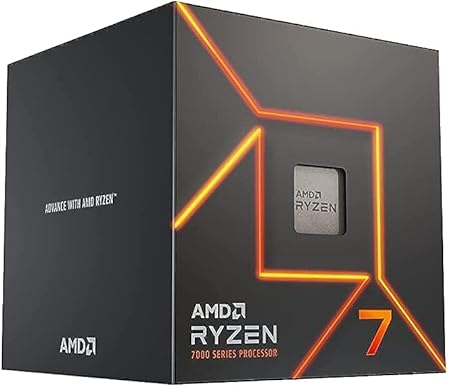AMD Ryzen 7 7700

The AMD Ryzen 7 7700 is a powerful CPU from the Ryzen 7000 Series featuring 8 cores and 16 threads, with a base clock speed of 3.8 GHz that can boost up to 5.3 GHz. It supports a maximum memory of 128 GB and utilizes the AM5 socket, making it compatible with the latest technology like PCIe 5.0 and DDR5-5200 memory.
Popularity: Low
Performance:
Specifications:
Model: AMD Ryzen 7 7700
Series: Ryzen 7000 Series
Architecture: Zen 4
Socket: AM5
Cores: 8
Threads: 16
Base Clock: 3.8 GHz
Max. Boost Clock: Up to 5.3 GHz
L2 Cache: 8 MB
L3 Cache: 32 MB
TDP: 65W
Power Consumption: 72.0 W
Max Memory: 128 GB
Max Memory Speed: DDR5-5200
Max Temp: 95°C
PCI Express Version: PCIe® 5.0
PCIe Lanes: 28 , 24
Overclocking: Yes
Integrated GPU: Yes
Cooler Boxed: yes
Instruction Set: x86-64
Launch Date: 01/14/2023
Manufacturer Page: Link
Review
The AMD Ryzen™ 7 7700 is a processor that exemplifies AMD's commitment to striking a balance between power efficiency and performance. With the introduction of the Zen 4 architecture, AMD has positioned this processor within the gamut of high-performing yet power-conscious options.
Specifications and Architecture
Boasting 8 cores and 16 threads, the Ryzen 7 7700 operates at a base clock of 3.8 GHz, with the capability to boost up to 5.3 GHz. This processor is built on TSMC’s 5nm manufacturing process and supports PCIe 5.0 and DDR5-5200 memory, highlighting its readiness for modern computing demands, particularly in gaming and content creation scenarios.
Performance Analysis
In terms of raw processing power, the Ryzen 7 7700 outpaces older AMD Ryzen 5000-series processors, demonstrating marked improvements in both single-threaded and multi-threaded workloads. This is particularly evident in applications like Cinebench R23, where the processor showcases superior levels of IPC due to its 5nm-fabbed Zen 4 core. However, it is worth noting that while the processor competes well with Intel’s Core i5-12600K, it struggles to surpass the newer Core i5-13600K, especially in multi-threaded tasks [PCMag].
When it comes to gaming performance, the Ryzen 7 7700 performs admirably across multiple resolutions, only slightly trailing behind some of its counterparts in a few test scenarios [AnandTech]. The iGPU is less robust, suitable mainly for non-gaming tasks, thus necessitating an external GPU for serious gaming endeavors [PCMag].
Efficiency and Thermals
A key strength of the Ryzen 7 7700 is its efficiency, operating at a restrained thermal design power (TDP) of 65W. This efficient use of power is particularly notable when the processor is benchmarked against its competition, such as the Intel Core i5-13600K, which, while faster in some applications, consumes significantly more power and generates more heat. Tests reveal that the Ryzen 7 7700 runs cooler and uses less energy, offering a superior performance-per-watt ratio [PCMag].
Cooling and Overclocking
The Ryzen 7 7700 comes bundled with the AMD Wraith Prism cooler, which is equipped to manage the thermal load without substantial noise, even with some degree of overclocking [PCMag]. The inclusion of this cooler with the packaged CPU is a notable advantage, offering cost savings over competitors that do not include a cooler.
Verdict
The AMD Ryzen™ 7 7700 is a formidable entry in the desktop processor market, particularly for those building energy-efficient systems. It excels in rendering, video encoding, and gaming scenarios when matched with a dedicated graphics card. However, its price juxtaposed with the Core i5-13600K may make potential buyers weigh their options carefully [PCMag]. Nonetheless, the Ryzen 7 7700’s overall package of performance, efficiency, and the included cooler makes it a compelling choice for users valuing balanced power and cost-effectiveness.